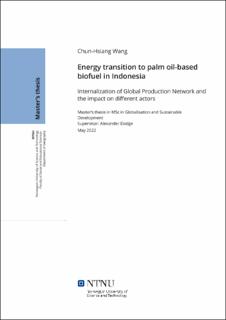Sammendrag
This thesis uses the development of palm oil-based biofuel production network in Indonesia to demonstrate how state can do to construct and shaped the Global Production Network (GPN) by playing several different actors at the same time. Construction of this production network relies heavily on the state regulations and policies, and the development of this production network is based on domestic raw material supply and domestic market consumption that all managed by state. Furthermore, this thesis also sheds light on the impact of state to GPN when state acts as regulator, investor, lead firm, main customer, retailer, and upgrader through State-Owned Enterprise (SOE) that has not been addressed in the GPN framework. Other than that, in order to understand the power dynamic within Indonesia biofuel production network, this thesis takes a deeper look into who are the actors within this production network, how are they being coupled or decoupled with the production network, and how are they been affected by this coupled or decoupled process. This thesis carried out fieldwork in Indonesia in order to understand how smallholders were infected by the development of this biofuel production network. Furthermore, in order to understand how policies were issued, this thesis uses resources nationalism to explain and understand state’s decision for issuing the domestic market-oriented policies with resources nationalism characteristics after the European Union (EU)’s decision to phase out palm oil-based biofuel as a sustainable biofuel. This thesis suggested that state through SOE will have a larger influence on the modern world supply chain and internalized of GPN, and state will be more and more important nowadays in creating and maintaining a new production network.
